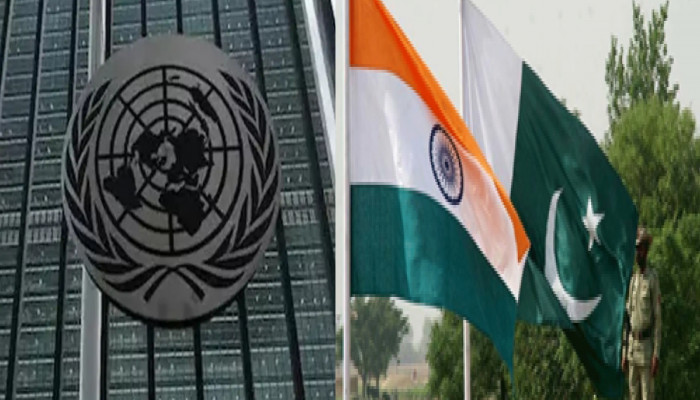UNSC calls for de-escalation, asks Pakistan ‘tough questions’amid rising Indo-Pak tensions
- In Reports
- 12:07 PM, May 06, 2025
- Myind Staff
The UN Security Council held a closed-door meeting to discuss the growing tensions between India and Pakistan. During the meeting, representatives urged both countries to calm the tensions and asked Pakistan some tough questions.
Greece, which is leading the Security Council for May, arranged the meeting on Monday after Pakistan—currently a non-permanent member—requested it. This discussion took place just days after a terrorist attack in Pahalgam, Jammu and Kashmir, where 26 people, mostly tourists, were killed, sparking strong reactions in India. The 15-member UN Security Council didn’t release a formal statement after the meeting, but Pakistan said it had mostly achieved what it wanted. Khaled Mohamed Khiari of Tunisia, who is the UN Assistant Secretary-General for the Middle East, Asia, and the Pacific, briefed the Council. He spoke on behalf of both the Political and Peacebuilding Affairs (DPPA) and the Peace Operations (DPO) departments.
During a 90-minute meeting, Council members expressed concerns about Pakistan's growing nuclear rhetoric and its recent missile tests, which they believe are contributing to regional instability. They also rejected Pakistan's claims of a "false flag" operation and called for accountability following a deadly attack. Additionally, there were questions about the potential involvement of the militant group Lashkar-e-Taiba (LeT), and worries were raised over tourists being targeted due to their religious identity.
After the meeting, Khiari said that members called for dialogue and a peaceful way to resolve the conflict. He also pointed out that the situation remains tense and unstable. Ambassador Evangelos Sekeris, the Permanent Representative of Greece to the United Nations and current President of the UNSC, described the meeting as productive and helpful. A Russian diplomat expressed hopes for de-escalation.
According to sources, members of the 15-nation Security Council asked Pakistan tough questions during an informal session. Pakistan was advised to resolve issues directly with India. The sources also mentioned that there was widespread condemnation of the terrorist attack, with a recognition of the need for accountability. Some members specifically mentioned that tourists were being targeted because of their religion, according to sources. Members of the UN Security Council did not accept the false flag claim and instead asked if the Pakistan-based group Lashkar-e-Taiba might be involved. Pakistan’s Permanent Representative to the United Nations, Ambassador Asim Iftikhar Ahmad, told reporters that the recent UN meeting mostly achieved what Pakistan aimed for.
He explained that the purpose of the closed-door talks was to let UN Security Council members discuss the worsening situation and growing tensions between India and Pakistan. The meeting also allowed them to share ideas on how to reduce the risk of conflict and focus on de-escalation. Ambassador Ahmad thanked the Council members for their involvement and for urging restraint, dialogue, and peaceful solutions. He emphasised that while Pakistan does not want conflict, it is fully ready to defend its sovereignty and borders if needed.
"Pakistan also raised the issue of India's suspension of the Indus Waters Treaty of 1960. Water is life, not a weapon. These rivers sustain over 240 million Pakistanis," he said. Ahmad mentioned at the meeting that Pakistan reaffirmed its commitment to maintaining peaceful and cooperative relationships with all its neighbours, including India. "We remain open to dialogue based on mutual respect and sovereign equality," he added. "In view of the gravity of the situation, the calls for dialogue, de-escalation and peaceful resolution of disputes, such as by the Secretary-General, and what we also heard from the Council members today are most pertinent," Ahmad said.
No significant result "can be expected from a discussion where a party to the conflict seeks to shape perceptions by using its membership of the Council," Syed Akbaruddin, India's former Permanent Representative to the UN, told PTI prior to the UNSC meeting. India will thwart such attempts by Pakistan. Following the meeting, he said, "Pakistan's grandstanding has flopped again today as in the past. As was expected, there was no meaningful response by the Council. Indian diplomacy has yet again successfully parried Pakistani efforts to seek the Security Council's intervention."
Just a few hours before the closed-door meeting, UN Secretary-General Antonio Guterres expressed his concern, saying that tensions between India and Pakistan are currently the highest they’ve been in years. "It pains me to see relations reaching a boiling point," he said at the UNSC stake-out to reporters. Guterres said he understands how deeply people are affected by the terrible terror attack in Pahalgam and again strongly condemned what happened. He said attacking innocent people is never acceptable and those behind it must be held accountable through fair and legal means.
The UN chief also emphasised that, especially now, it's very important to avoid any military conflict, as it could quickly get out of control. "Now is the time for maximum restraint and stepping back from the brink. That has been my message in my ongoing outreach with both countries. Make no mistake: A military solution is no solution," the UN chief said.
The United Nations Security Council has five permanent members with veto power—China, France, Russia, the United Kingdom, and the United States. In addition to them, there are ten non-permanent members: Algeria, Denmark, Greece, Guyana, Pakistan, Panama, South Korea, Sierra Leone, Slovenia and Somalia.







Comments